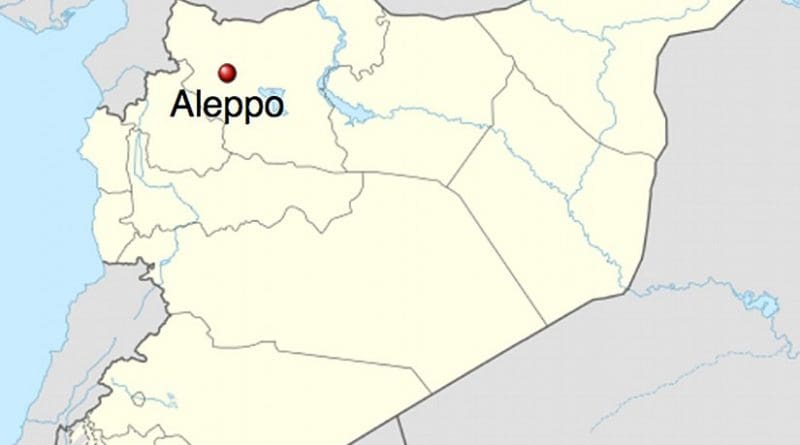The Battle For Aleppo And Imminent Regional Shifts – Analysis
By IPCS
By Ranjit Gupta*
Aleppo, the crossroads of civilisation for millennia, Syria’s largest city, and its main commercial and cultural centre, is also the most important strategic gateway from Turkey into Syria. Controlling Aleppo is essential for any ruler to control Syria. Therefore, the battle for Aleppo is crucial for the future of Syria and indeed the Levant.
Aleppo was the last city to join the uprising against Assad. It got divided into government and rebel-controlled areas around mid-2012, along lines that had remained largely unchanged till fighting intensified greatly – particularly from June 2016 onwards – culminating in the current relentless, indiscriminate and the most lethal bombardment of rebel controlled parts of the city by Russian and Syrian air forces in nearly six years of war. Hospitals have been hit and civilian casualties are rising as supplies run out and soon, supply routes will no longer be available.
Having little or no choice left, the main insurgent groups in Aleppo such as Ahrar Al Sham, who are themselves ultra-radical, have coalesced under the umbrella of Jaysh al-Fateh and inevitably joined hands with al Qaeda linked Jabhat Fatah al Sham (formerly known as the Jabhat al-Nusra Front). This renaming is a ruse that nobody takes seriously. Even moderate rebel groups backed by the West have little option but to ally with these radical salafi jihadis. However, none of this can be a justification for what has now become a no holds barred aerial assault, the worst of the five-and-half-year old war. On 08 October 2016, China, which has consistently voted with Russia on UN resolutions relating to the Syrian crisis, felt constrained to abstain on the Franco Spanish Resolution demanding an immediate halt in the aerial strikes on Aleppo in the UN Security Council. Nevertheless Russia brazenly vetoed this Resolution, making it abundantly clear that it is determined to ensure that the Assad regime wins control of Aleppo, immaterial of what the world thinks.
Russia is well aware of US President Barack Obama’s steadfast refusal to get militarily involved in Syria; and now in the past four months of his presidency, chances of assertive US counter intervention are almost nil. Other Western countries have supplied arms but have refrained from military intervention against Syrian President Bashar al Assad in Syria like they had done in Libya; and with Europe facing multiple internal challenges, they cannot take any meaningful counter action. West Asian Sunni countries are simply incapable of doing so and in any case, Saudi Arabia is deeply involved in the debilitating, self-defeating Yemeni quagmire of its own creation. Finally, the most assertive foreign power that could have done something meaningful – Turkey – has changed its policies dramatically in the wake of the coup in Ankara, with Erdogan and Putin having met 3 times in three months – in St Petersburg in August 2016; at the G20 summit in September 2016; and in Istanbul in October 2016.
Turkey’s primary priority in Syria henceforth will be curbing the Syrian Kurds. Russia knows it has a relatively free hand and is taking the fullest advantage of current regional and global geopolitical ground realities.
It may take a few weeks or even a few months but Assad’s victory in Aleppo is now assured, backed up also by the proactive involvement of Iranian patronised Hezbollah and various Shia militias. With victory in Aleppo, Assad will have gained control of all the major cities – Damascus, Hama, Homs, Latakia, etc. However, to gain full control of even the Western two-fifths of the country – which includes these cities and where 70 per cent of Syria’s population lived – Assad has to gain control over the highly strategic Idlib province that is still largely under the control of the rebels. This will take time, possibly even a couple of years.
Winning control of Aleppo will not mean an end to the war in Syria. Peace in Syria is many years away. The main consequences of an Assad/Iran/Russia victory in Aleppo are likely to be following:-
1. Possibilities of any new regime or even transitional arrangements towards a new regime would become largely academic.
2. Assad will continue as the ruler of Syria albeit only of a truncated part of the country for the foreseeable future until such time as Russia and Iran decide that they are ready for an alternative.
3. Syria will find itself de facto partitioned into a western part under Assad; the relatively sparsely populated, comparatively arid and economically weak central part where the rebels will be jostling for control with Assad on the one hand and the Islamic State on the other; a de facto Kurdish autonomous zone along much of the border with Turkey – which will face continuous assaults from the Islamic State (IS), some rebel groups and, in some locations, from the Assad regime also, but pre-eminently from Turkey; and, finally, territories under the control of the (IS) that will be under full-scale assault from all sides, particularly from Western powers.
4. The effort to overthrow Assad will be transformed into a long-term Sunni guerrilla insurgency. The situation in Syria becoming an Afghanistan like scenario cannot be ruled out.
5. However, the most significant consequence will be a very considerable reshaping of the geostrategic landscape of West Asia. Iran will emerge as the undisputed regional hegemonic power. Russia will upgrade its naval and air bases into major facilities on a permanent basis and ensure a long-term strategic niche role for itself in West Asia and the eastern Mediterranean. The more than a century old unchallengeable Western domination of West Asia will finally end.
* Ranjit Gupta
Distinguished Fellow and Columnist, IPCS; former Indian Ambassador to Yemen and Oman; and former Member, National Security Advisory Board (NSAB), India

